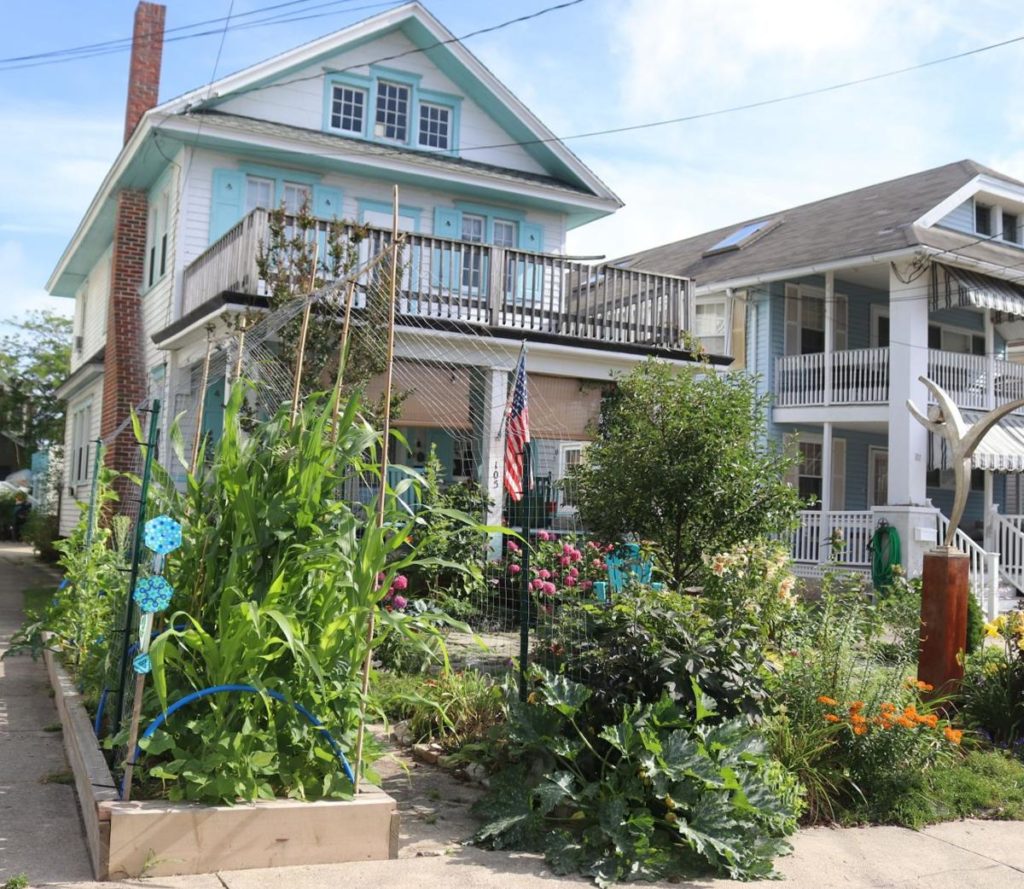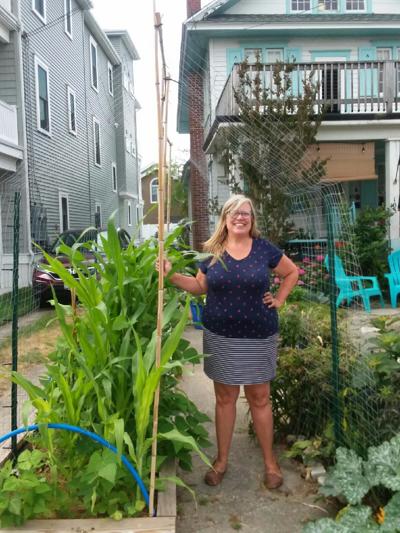
OCEAN CITY – This year (2020) is not the first time Amy Havens tried to grow food around her home, in the north end of Ocean City.
“I tried to grow corn last year. It was a disaster,” she said.
This year’s attempt is more expansive and elaborate. It’s also been more successful.
“I feel like there are only a couple of good responses to a pandemic. I think growing food is probably one of the most sensible responses you can come up with.”
Amy Havens
She’s harvested fruits and vegetables, with a lot more likely to come. She’s got plenty of zucchini, a prolific vegetable in southern New Jersey that often grows faster than most families can eat it.
She’s also planted corn, blueberries, cantaloupe, beans and squash, and a variety of tomatoes, along with some basil that’s likely to accompany those tomatoes.
Although her neighborhood is often called “The Gardens,” her yard is an anomaly in a spot where manicured lawns or crushed stone yards are far more common. She said her neighbors have been curious and supportive.
Some peppered her with questions, while others have said it looks great.
Much of the front was given over to perennials, so she found additional space on the sides and behind the house.
“I really had to start with how do you garden on concrete?” she said. Decades ago, most of the area behind the house was paved for parking.
Inspired by documentaries about urban gardeners, she built raised beds from scrap wood and sought affordable ways to buy enough dirt to fill them. A ceramics teacher, at Atlantic City High School, the closure for the coronavirus has meant she is home a lot more than other years.
“For one thing, I had the time,” Havens said. In the spring, there were concerns raised about the supply chain for food, and the nation experienced extraordinary shortages of less vital necessities, like toilet paper.
“I feel like there are only a couple of good responses to a pandemic,” Havens said. “I think growing food is probably one of the most sensible responses you can come up with.”
Havens is not alone.
Growing Interest
Jen Sawyer, the master gardener coordinator and program associate for commercial agriculture with the Rutgers Cooperative Extension, in Cape May County, reports she has seen an increased interest in growing food at home and that there has been a similar uptick in other counties.
The Rutgers Extension has offered weekly webinars for home growers since the shutdown began, she said. Most of the people she’s working with have long had an interest in growing their own vegetable gardens, she said.
“Now, with many people at home, and the desire to have fresh produce available for them and their families has given them the impetus to begin,” Sawyer said.
The increasing popularity of home gardening predates the pandemic, but this spring saw a surging demand for seeds throughout the nation. As other items grew scarce, in April, so did gardening supplies and seeds. National media reported some companies temporarily suspended new orders to catch up with the demand.
In southern New Jersey, this is nothing new. Many families have kept backyard gardens for generations. Tomatoes seem to be a favorite, with multiple varieties of the plants tucked in along alleyways and in sunny spots throughout the county.
Home gardens have a history as a response to national emergencies. Victory gardens sprang up around the nation during World War I to offset shortages and to supplement rations. Efforts were renewed during the Second World War, with government posters encouraging growing food at home.
Sawyer sees similarities in today’s gardeners.
“I think the movement has been growing over the years for locally and sustainably grown foods, and this is a way for people to get started,” she said. “I also think it is a bit out of concern on availability. I’ve encountered many people who grow their own vegetables and fruits but also frequent the local small farmers’ stands to supplement what they do not grow themselves.”
There are other motivations at work.
Experiment in Permaculture
For Peaches Lukens – whose given name is Gail, but who has been better known by her nickname since childhood – growing her own food is an exercise in sustainability and conservation.
“The local farm is the way of the future. Trucking all this stuff and flying all of this stuff in is ridiculous,” she said. Fruits and vegetables are routinely shipped internationally, giving New Jersey a taste of other climates with bananas and avocados and keeping seasonal strawberries and tomatoes on the shelves year-round.
Inspired by stories and documentaries on urban farming, Lukens began to transform her home, in Ocean City, into a lot-sized farm. One such story, that of Jules Dervaes, who began growing tons of food on a lot one-fifth of an acre in Pasadena, fired her imagination.
“He was growing 6,000 pounds of food in his front and backyard. That just blew me away,” she said. Beginning years ago, Lukens said the response she received, in Ocean City, tended toward the skeptical or incredulous.
“A lot of people would walk by and be like, ‘what are you doing?’ I’m growing food,” she said.
Eventually, she and her husband, Mike, were ready to make a move, buying a three-acre property that once held a small farm just south of the Cape May Canal.
“It’s amazing. It’s like utopia,” she said.
“The local farm is the way of the future. Trucking all this stuff and flying all of this stuff in is ridiculous.”
Gail “Peaches” Lukens
For now, she is working on sustenance farming, trying to produce enough to live on without using artificial fertilizers or chemical pesticides. They have hens for eggs and have planted fruit trees. They are also trying not to disturb the ecosystem, with plans to increase a small patch of woods in one corner.
“We really want to create habitat,” she said. They’ve named it Morning Glory Farm and describe it as an experiment in permaculture, seeking to work with the local ecosystem to restore soil and support life in the long term.
Preppers with Green Thumbs
Havens is looking at other ways to support herself. She wants to learn more about canning, drying, and other traditional means of food preparation to help stores last through the winter and has become interested in crabbing as a way to gather more food nearby.

It’s not that she thinks society is about to collapse, and she dismisses the stereotype of a doomsday prepper who seems more interested in collecting firepower and canned goods than in growing something sustainable, but she, too, has been inspired by blogs, documentaries, and websites about how to grow food at home.
She’s growing elderberries, cantaloupe, blueberries, and lots of beans, while in the back is a spot labeled for a future fig tree. Havens is looking to the distant past for inspiration, growing corn, squash, and beans in close proximity, a combination some Native American nations called “three sisters.” This saves space, and these specific plants help each other. Rather than competing for nutrients, each adds to the soil what the others need. Proponents say the three together also provide complete proteins and enough nutrition to sustain human life.
“It’s mostly working,” she said. She’s already learned a lot, about soil and about the plants, she said, but understands there is a lot more learning to do. “I didn’t really know what would grow here, so I figured why not try everything.”
It Can be ‘as Expensive… as You Want’
Havens plans to buy as little as possible in the coming years. Sometimes, homegrown food can end up costing more than the same vegetables bought at a stand or neighborhood farm market.
“A lot of time it’s just a hobby that costs more than it generates,” she said. “That could end up happening to us. If I save seeds and the dirt is here, by next year it should cost next to nothing.”
“Gardening can be as expensive or as economical as you want,” said Sawyer. “Costs will depend on the type of gardening they want to do and how much they want to plant, for their initial start-up costs.”
She suggested investing in a soil test, which costs about $20, and the extension staff can help interpret.
“Well maintained and established gardens can continue to produce for years and years, with minimal cost inputs beyond seeds/plants and soil amendments,” Sawyer said. “When I teach to beginning gardeners, I always encourage them to talk to their neighbors who grow and think about doing plant or produce swaps. Maybe your garden is great for growing potatoes, but not lettuce, but your neighbor grows lettuce, but doesn’t have room for potatoes. This shares the work and cost and helps build relationships.”
An easy way to start can be a few herbs in a planter on a deck. She said there are several varieties of vegetables that have been bred for small containers.
“I always suggest new gardeners think about the produce they enjoy eating and starting small with those,” she said. “Herbs are great, as many are perennial and grow well. I want people to be successful when they start, so they continue growing their garden spaces over the seasons. Small spaces are also great for getting the children involved. They can have their own container to plant and take care of.”
Even a small area can produce a significant amount of food, she said.
The next virtual workshop is set for Aug. 6, she said. The extension in Court House can be reached at (609) 465-5115.
This story was produced in collaboration with CivicStory and the New Jersey Sustainability Reporting Hub project. It was originally reported by Bill Barlow for the Cape May County Herald, and may be re-distributed through the Creative Commons License, with attribution.
